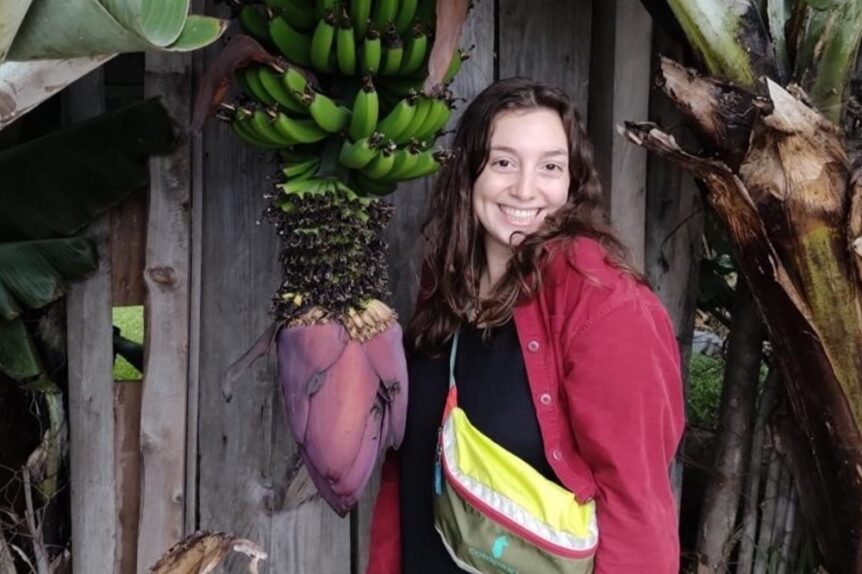Above: Elizabeth Margolis, 11th Class Leland Fellow.
As a Leland Fellow with World Vision International, I have spent the last year working on advocacy to end global hunger. I have been very focused on amplifying the voices of people affected by hunger, especially children, in my advocacy work this past year.
Advocacy must magnify the voices of affected people – not only is this one of the core values of the Leland Fellowship, but it is essential for me personally that my advocacy work at World Vision gives people affected by hunger a platform to speak about their own experiences. It ultimately leads to better outcomes and participation for the people all around the world who World Vision serves, by giving them a voice to influence decision-makers and to be a part of designing solutions to the problems they experience daily. This is also a part of our commitment to being accountable to affected people.
Over the past year, I have been integrating this as a priority into World Vision’s Global Hunger Response, systematizing it, and providing concrete tools and strategies to make it happen. Since World Vision is a child-focused agency, using children’s voices is especially central to our advocacy work. Unfortunately, children’s voices are often the least heard – so we have been working hard to give opportunities for them to speak.
Advocacy is a broad term. Sometimes advocacy looks like fundraising or social media campaigns. Sometimes we write articles, joint letters, or host events. Other times we seek to influence policy or decision-making processes in governments or the UN. For example, I recently wrote this short publication using quotes from children that World Vision interviewed to show how children across West Africa are being impacted by hunger: Impact of Food Insecurity on Children in West Africa.
One quote that stuck with me from this research is: “We eat only once a day, and sometimes we go the night without eating. We have to eat well to go to school, lest we drop out because of hunger.” – Child in Central African Republic.
The process of amplifying children’s voices for policy change (or for advocacy) has more steps in it than one might think. First, we had to integrate this as an objective across all advocacy for the Global Hunger Response: in the advocacy strategy, the Advocacy Response Group, in guidance given to regional and country-level offices, etc. To set this as a goal for the Global Hunger Response’s advocacy, we wrote this objective:
“Wherever possible, amplify the voices of children and people affected by hunger, especially women, elderly, Indigenous, disabled, refugee or displaced populations, and other marginalized groups, in advocacy for policy change and in decision-making to prevent famine and address other negative effects of hunger and food insecurity.”
Amplifying children’s voices – including their opinions and identified solutions – as a tactic and a goal in advocacy was only the beginning. We also needed systematic ways to collect those experiences and proposed solutions from children or others experiencing hunger. Often World Vision participates in events where we could suggest a speaker – but it is not always easy to find speakers and help them prepare, especially if they are children or youth. Therefore, I decided to survey our country offices to see where we have strong connections to affected children or youth who would be willing to speak about their personal experiences of hunger at high-level events. In many contexts, World Vision works to strengthen networks of children and youth, providing training and resources to equip young advocates. This enables us to find speakers when global opportunities arise and to work with those speakers to train and prepare them to share their stories with impact, to understand the event’s audience, etc.
World Vision has teams of people working on child participation, so this kind of work is not new to us. But I have learned that it is crucial to create tools and systematize these goals so that we can achieve them. Learning this has helped me to develop as a leader and to take the initiative to create tools to overcome challenges and fill gaps to enable my team to meet our goal of further amplifying the voices of children and affected people.
To get a better idea of the ways you can amplify the voices of affected people, check out some of World Vision’s work:
- Listen to Susan, a refugee from South Sudan living in Uganda, speak on behalf of World Vision at a side event for the UN Economic and Social Committee’s Humanitarian Affairs Segment (June 2021): Recording available here, Susan speaks 1:00:40 – 1:06:00
- Check out this video World Vision made sharing children’s calls for climate action: Youth speak out about climate change, which I used in an advocacy piece for Earth Day “Will today’s hunger crisis leave children a healthy planet tomorrow?“
- World Vision Social Accountability: https://www.wvi.org/our-work/socialaccountability
- World Vision Child Participation: https://www.wvi.org/our-work/child-participation

